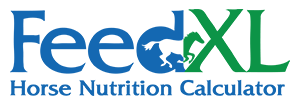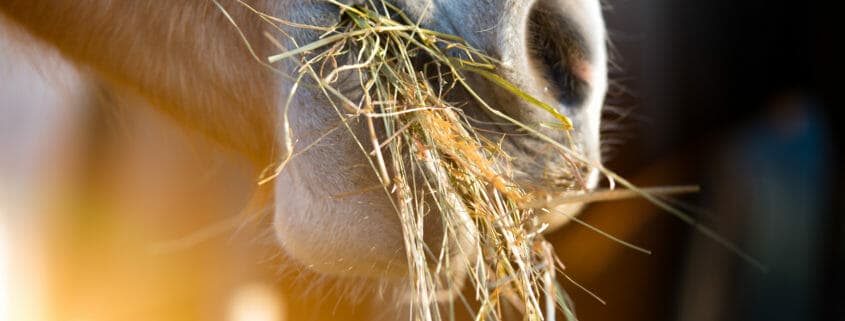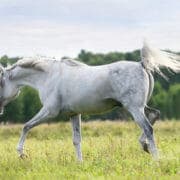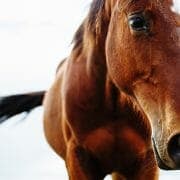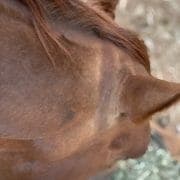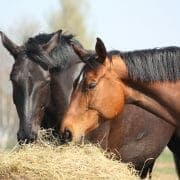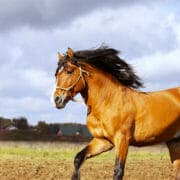Feeding the Easy Keeper
Many individuals mistakenly believe that restricting feed drastically or feeding low-quality diets, such as straw, is the only solution for overweight or easy keeper horses. However, while this approach limits calorie intake and promotes weight loss, it also severely restricts essential nutrients like protein, vitamins, and minerals, potentially leading to various health issues.
Important steps for managing an easy keeper on a calorie-restricted diet:
- Manage Pasture Access: Many pastures today are too rich for some horses and result in weight gain. Limiting access to pasture by either using a grazing muzzle or stabling the horse during certain periods can control intake. Grazing muzzles are particularly useful as they allow the horse to graze with their head down and interact with others while moderating feed intake, crucial for digestive and respiratory health.
- Provide Low-Quality Hay: Since pasture access is restricted, supplementing with high-fiber forages like weather-damaged lucerne hay or cereal crop straw is essential. These provide necessary roughage without excess calories. A minimum of 2% of the horse’s body weight in hay (e.g., 10 kg for a 500 kg horse) should be fed daily if pasture access is unavailable. Depending on the quality of the pasture and how much access is available, you will have to adjust your horse’s hay intake. Use FeedXL to work out how much hay is needed to meet your horse’s feed intake requirement without overfeeding digestible energy. Using multiple hay nets slows consumption, preventing boredom and supporting healthy digestion.
- Incorporate High-Quality Protein: While reducing calorie intake through restricted access and low-quality forage, it’s crucial to meet protein requirements to prevent muscle loss and maintain coat and hoof quality. Full-fat soybean or soybean meal, in small amounts (up to 400 grams daily for a 500 kg horse on a poor hay diet), provides high-quality plant protein. Adding a small quantity of lucerne hay or chaff further supplements protein intake.
- Meet Vitamin and Mineral Needs: It’s essential not to compromise the overweight horse’s health by restricting vitamin and mineral requirements. Look for a complete vitamin and mineral supplement that can ideally be fed at a dose of less than 100 g/day to meet requirements without adding unneeded calories.
- Include Quality Oils: Horses on restricted diets often lack shine in their coats due to a lack of omega fatty acids, even on otherwise balanced diets. Supplementing with ¼ cup of oil that contains the proper balance of omega 3 and omega 6 fatty acids to the diet per day can make sure their essential omega fatty acid requirements are met and keep their skin and coat healthy.
- Provide Access to Salt: All horses, including easy keepers, should have constant access to a salt lick as well as constant access to clean, fresh water.
An example of what to feed an easy keeper (weighing 500 kg):
- Restricted pasture access (grazing muzzle or yarded overnight)
- 2 kg/day (approximately 4.5 lb) poor-quality meadow hay
- Up to 100 g/day (approximately 3.5 oz) balanced vitamin and mineral supplement
- 60 ml/day canola oil
- 250 g/day (approximately 9 oz) good-quality lucerne chaff
- Free access to salt lick
If pasture quality is “poor” (visibly dried, brown, with seedheads present), full-fat soybean could be supplemented for additional protein.
Why Addressing Weight Matters:
Overweight horses face numerous health challenges similar to humans, including insulin resistance, laminitis, increased joint wear, reduced mobility, and heat stress. A carefully balanced diet not only helps manage weight but also promotes overall health and well-being. Simply restricting calories without meeting other nutritional needs can lead to an unhealthy, undernourished horse.
It’s essential to approach weight management in horses with a balanced diet that restricts calories while ensuring all nutrient requirements are met. This approach supports optimal health and longevity, avoiding the pitfalls of extreme dietary restrictions that compromise overall well-being.
Do you have a question or comment? Do you need help with feeding?
We would love to welcome you to our FeedXL Horse Nutrition Facebook Group. Ask questions and have them answered by PhD and Masters qualified equine nutritionists and spend time with like-minded horse owners. It’s free!
Click here to join the FeedXL Horse Nutrition Facebook Group
